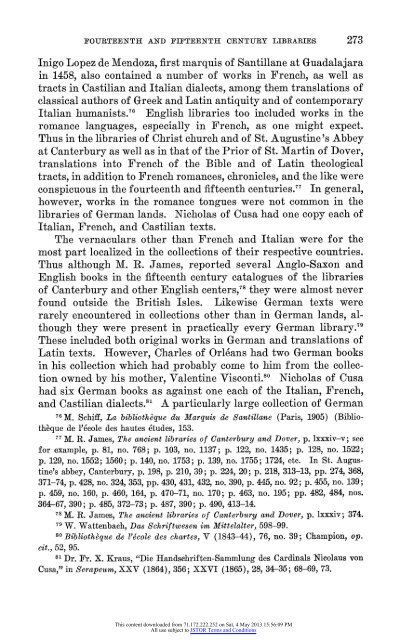The Intellectual Interests Reflected in Libraries of the Fourteenth and ...
The Intellectual Interests Reflected in Libraries of the Fourteenth and ...
The Intellectual Interests Reflected in Libraries of the Fourteenth and ...
You also want an ePaper? Increase the reach of your titles
YUMPU automatically turns print PDFs into web optimized ePapers that Google loves.
FOURTEENTH AND FIFTEENTH CENTURY LIBRARIES 273<br />
Inigo Lopez de Mendoza, first marquis <strong>of</strong> Santillane at Guadalajara<br />
<strong>in</strong> 1458, also conta<strong>in</strong>ed a number <strong>of</strong> works <strong>in</strong> French, as well as<br />
tracts <strong>in</strong> Castilian <strong>and</strong> Italian dialects, among <strong>the</strong>m translations <strong>of</strong><br />
classical authors <strong>of</strong> Greek <strong>and</strong> Lat<strong>in</strong> antiquity <strong>and</strong> <strong>of</strong> contemporary<br />
Italian humanists.76 English libraries too <strong>in</strong>cluded works <strong>in</strong> <strong>the</strong><br />
romance languages, especially <strong>in</strong> French, as one might expect.<br />
Thus <strong>in</strong> <strong>the</strong> libraries <strong>of</strong> Christ church <strong>and</strong> <strong>of</strong> St. August<strong>in</strong>e's Abbey<br />
at Canterbury as well as <strong>in</strong> that <strong>of</strong> <strong>the</strong> Prior <strong>of</strong> St. Mart<strong>in</strong> <strong>of</strong> Dover,<br />
translations <strong>in</strong>to French <strong>of</strong> <strong>the</strong> Bible <strong>and</strong> <strong>of</strong> Lat<strong>in</strong> <strong>the</strong>ological<br />
tracts, <strong>in</strong> additiQn to French romances, chronicles, <strong>and</strong> <strong>the</strong> like were<br />
conspicuous <strong>in</strong> <strong>the</strong> fourteenth <strong>and</strong> fifteenth centuries.77 In general,<br />
however, works <strong>in</strong> <strong>the</strong> romance tongues were not common <strong>in</strong> <strong>the</strong><br />
libraries <strong>of</strong> German l<strong>and</strong>s. Nicholas <strong>of</strong> Cusa had one copy each <strong>of</strong><br />
Italian, French, <strong>and</strong> Castilian texts.<br />
<strong>The</strong> vernaculars o<strong>the</strong>r than French <strong>and</strong> Italian were for <strong>the</strong><br />
most part localized <strong>in</strong> <strong>the</strong> collections <strong>of</strong> <strong>the</strong>ir respective countries.<br />
Thus although M. R. James, reported several Anglo-Saxon <strong>and</strong><br />
English books <strong>in</strong> <strong>the</strong> fifteenth century catalogues <strong>of</strong> <strong>the</strong> libraries<br />
<strong>of</strong> Canterbury <strong>and</strong> o<strong>the</strong>r English centers,78 <strong>the</strong>y were almost never<br />
found outside <strong>the</strong> British Isles. Likewise German texts were<br />
rarely encountered <strong>in</strong> collections o<strong>the</strong>r than <strong>in</strong> German l<strong>and</strong>s, although<br />
<strong>the</strong>y were present <strong>in</strong> practically every German library.79<br />
<strong>The</strong>se <strong>in</strong>cluded both orig<strong>in</strong>al works <strong>in</strong> German <strong>and</strong> translations <strong>of</strong><br />
Lat<strong>in</strong> texts. However, Charles <strong>of</strong> Orleans had two German books<br />
<strong>in</strong> his collection which had probably come to him from <strong>the</strong> collection<br />
owned by his mo<strong>the</strong>r, Valent<strong>in</strong>e Visconti.80 Nicholas <strong>of</strong> Cusa<br />
had six German books as aga<strong>in</strong>st one each <strong>of</strong> <strong>the</strong> Italian, French,<br />
<strong>and</strong> Castilian dialects.81 A particularly large collection <strong>of</strong> German<br />
76M. Schiff, La biblio<strong>the</strong>que du Marquis de Santillane (Paris, 1905) (Biblio<strong>the</strong>que<br />
de 1'eeole des hautes etudes, 153.<br />
77 M. R. James, <strong>The</strong> ancient libraries <strong>of</strong> Canterbury <strong>and</strong> Dover, p. lxxxiv-v; see<br />
for example, p. 81, no. 768; p. 103, no. 1137; p. 122, no. 1435; p. 128, no. 1522;<br />
p. 129, no. 1552; 1560; p. 140, no. 1753; p. 139, no. 1755; 1724, etc. In St. August<strong>in</strong>e's<br />
abbey, Canterbury, p. 198, p. 210, 39; p. 224, 20; p. 218, 313-13, pp. 274, 368,<br />
371-74, p. 428, no. 324, 353, pp. 430, 431, 432, no. 390, p. 445, no. 92; p. 455, no. 139;<br />
p. 459, no. 160, p. 460, 164, p. 470-71, no. 170; p. 463, no. 195; pp. 482, 484, nos.<br />
364-67, 390; p. 485, 372-73; p. 487, 390; p. 490, 413-14.<br />
78 M. R. James, <strong>The</strong> ancient libraries <strong>of</strong> Canterbury <strong>and</strong> Dover, p. lxxxiv; 374.<br />
79 W. Wattenbach, Das Schriftwesen im Mittelalter, 598-99.<br />
80 Biblio<strong>the</strong>que de 1'ecole des chartes, V (1843-44), 76, no. 39; Champion, op.<br />
cit., 52, 95.<br />
81 Dr. Fr. X. Kraus, "Die H<strong>and</strong>schriften-Sammlung des Card<strong>in</strong>als Nicolaus von<br />
Cusa," <strong>in</strong> Serapeum, XXV (1864), 356; XXVI (1865), 28, 34-35; 68-69, 73.<br />
This content downloaded from 71.172.222.252 on Sat, 4 May 2013 15:56:09 PM<br />
All use subject to JSTOR Terms <strong>and</strong> Conditions

















